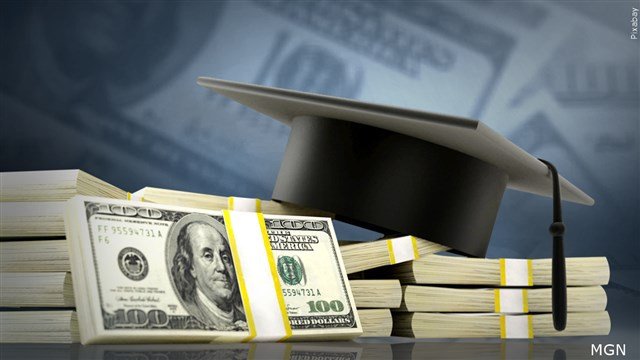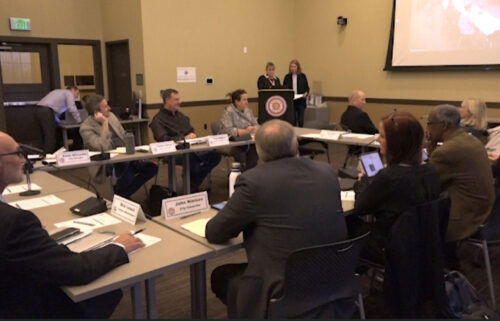Merkley, Wyden, colleagues urge administration to extend student loan repayment pause

And to cancel student debt; want follow trough on pledge to improve handling of student debt bankruptcy claims
WASHINGTON (KTVZ) -- Sens. Jeff Merkley and Ron Wyden, D-Ore., cosigned a letter Friday to President Biden, urging the administration to act now to extend the pause on federally held student loan payments until at least the end of the year and to provide meaningful student debt cancellation.
“Given the fast-approaching deadline for borrowers to resume payments, your administration must act as quickly as possible to extend the pause and make clear to the American public your intention to cancel a meaningful amount of student debt. We look forward to supporting your administration in getting it done,” wrote the lawmakers.
The payment pause has made a significant difference throughout the pandemic, providing essential relief to millions of families during the economic and public health crisis, and saving borrowers an average of $393 per month, the lawmakers said in a news release, which continues in full below:
Borrowers have greatly benefited from the ongoing payment pause, taking the opportunity to pay down other debt, relieve financial pressures from lost jobs or decreased earnings, and support their families' needs. Restarting repayment will financially destabilize many borrowers, and will cause hardship for many who cannot afford repayment. Most borrowers are not financially prepared to shoulder another bill as they face skyrocketing costs for necessities like food and gas.
Black students in particular borrow more to attend college, borrow more often while they are in school, and have a harder time paying their debt off than their white peers. They are more than three times as likely to go into default within four years on their federal loans as white borrowers – and face wage garnishment, tax refund withholding, and federal benefit offset.
Latino borrowers are more likely to struggle in repaying their loans and have some of the lowest post-education earnings among all racial or ethnic groups. For example, even when controlling for educational attainment, Latinos with bachelor’s degrees earn 21% less than their white peers do.
When looking at disparities in default, twenty percent of Latino borrowers defaulted on their student loans compared to 13% of white borrowers six years after starting college. On top of that, communities of color have also had higher rates of illness and death from COVID-19 throughout the pandemic.
“Canceling student debt is one of the most powerful ways to address racial and economic equity issues. The student loan system mirrors many of the inequalities that plague American society and widens the racial wealth gap,” they continued. “Student debt cancellation must be one of the key actions in your comprehensive approach to advance equity as our nation works to rebuild a stronger and more equitable economy.”
Full text of the letter can be found here.
The letter is led by Senators Elizabeth Warren (D-MA) and Majority Leader Chuck Schumer (D-NY), along with Representatives Ayanna Pressley (D-MA), Alex Padilla (D-CA), Raphael Warnock (D-GA), Ilhan Omar (D-MN), Pramila Jayapal (D-WA), and House Majority Whip James E. Clyburn (D-SC).
Joining the letter, in addition to Merkley and Wyden, in the Senate are Senators Bob Menendez (D-N.J.), Bernard Sanders (I-Vt.), Richard Blumenthal (D-Conn.), Mazie K. Hirono (D-Hawaii), Cory Booker (D-N.J.), Sherrod Brown (D-Ohio), Tina Smith (D-Minn.), Sheldon Whitehouse (D-R.I.), Chris Van Hollen (D-Md.), Kirsten Gillibrand (D-N.Y.), Edward J. Markey (D-Mass.), Dick Durbin (D-Ill.), Tammy Duckworth (D-Ill.), Brian Schatz (D-Hawaii), and Ben Ray Luján (D-N.M.).
Joining the letter in the House are Representatives Madeline Dean (D-Pa.), Steven Horsford (D-Nev.), Jamaal Bowman (D-N.Y.), Jan Schakowsky (D-Ill.), Barbara Lee (D-Calif.), Alexandria Ocasio-Cortez (D-N.Y.), Mondaire Jones (D-N.Y.), Grace Meng (D-N.Y.), Katherine Clark (D-Mass.), Nikema Williams (D-Ga.), Bonnie Watson Coleman (D-N.J.), Mark Takano (D-Calif.), Jesus G. “Chuy” García (D-Ill.), Jerrold Nadler (D-N.Y.), Earl Blumenauer (D-Ore.), Nydia M. Velázquez (D-N.Y.), Federica Wilson (D-Fla.), Ro Khanna (D-Calif.), Yvette D. Clarke (D-N.Y.), Hakeem Jeffries (D-N.Y.), Grace F. Napolitano (D-Calif.), Rashida Tlaib (D-Mich.), Andy Levin (D-Mich.), James P. McGovern (D-Mass.), Raúl M. Grijalva (D-Ariz.), Carolyn B. Maloney (D-N.Y.), Henry C. “Hank” Johnson Jr. (D-Ga.), Alma S. Adams (D-N.C.), Ritchie Torres (D-N.Y.), Bennie G. Thompson (D-Miss.), Danny K. Davis (D-Ill.), Judy Chu (D-Calif.), Jahana Hayes (D-Conn.), John B. Larson (D-Conn.), Ted W. Lieu (D-Calif.), Terri A. Sewell (D-Ala.), Donald M. Payne, Jr (D-N.J.), Dwight Evans (D-Pa.), Adriano Espaillat (D-N.Y.), André Carson (D-Ind.), Peter Welch (D-Vt.), Jimmy Gomez (D-Calif.), Alan Lowenthal (D-Calif.), David N. Cicilline (D-R.I.), Cori Bush (D-Mo.), Marie Newman (D-Ill.), Adam B. Schiff (D-Calif.), J. Luis Correa (D-Calif.), Ann Kirkpatrick (D-Ariz.), Linda Sánchez (D-Calif.), Brendan F. Boyle (D-Pa.), Albio Sires (D-N.J.), Mark DeSaulnier (D-Calif.), Eleanor Holmes Norton (D-D.C.), Katie Porter (D-Calif.), Salud Carbajal (D-Calif.), Betty McCollum (D-Minn.), Sylvia R. Garcia (D-Texas), Frank Pallone (D-N.J.), Nanette Diaz Barragán (D-Calif.), Paul D. Tonko (D-N.Y.), Troy A. Carter (D-La.), G. K. Butterfield (D-N.C.), Jim Cooper (D-Tenn.), Tom Suozzi (D-N.Y.), Sanford D. Bishop, Jr (D-Ga.), Stephen F. Lynch (D-Mass.), Vicente Gonzalez (D-Texas), Emanuel Cleaver, II (D-Mo.), Michael F.Q. San Nicholas (D-Guam.), Anthony G. Brown (D-Md.), and Sheila Cherfilus-McCormick (D-Fla.).
Wyden and Merkley also joined colleagues in asking the federal Departments of Education and Justice for an update on efforts to improve how the agencies handle undue hardship claims by student borrowers in bankruptcy proceedings.
“The undue hardship exception (11 U.S.C. 523(a)(8)) currently serves as the only option in the bankruptcy code for discharge of student loans, and that exception has been narrowly construed by most courts. The federal government’s aggressive litigation challenges against students who pursue undue hardship claims further exacerbates this situation,” the senators wrote in their letter this week to Secretary of Education Miguel Cardona and Attorney General Merrick Garland. “All too often, [Department of Education] ED and [Department of Justice] DOJ oppose undue hardship discharges in adversarial bankruptcy proceedings, requiring debtors to effectively demonstrate a certainty of hopelessness before they can obtain relief. Clearing this statutorily unnecessary high bar is challenging enough for individuals who are represented by experienced attorneys. It is virtually impossible for those without representation.”
More than 45 million Americans hold more than $1.7 trillion in student loan debt, and cumulative student loan debt is the second largest category of consumer debt after mortgages. While most forms of debt can be discharged through the bankruptcy process, student loan debt is currently treated as non-dischargeable except in extremely rare cases of “undue hardship.” The term “undue hardship” has been interpreted by courts to establish high hurdles for borrowers to meet—a challenge made even more difficult by federal agency policies that encourage aggressive challenges in bankruptcy court when student borrowers bring undue hardship claims.
In the letter, Wyden and Merkley called on Secretary Cardona to follow through on his public statement that the Department of Education (ED) would change the Department’s approach to “undue hardship” claims to make it a more attainable option for discharging student debt in bankruptcy. The Senators also called on the Department of Education to promptly release a long-awaited update to guidance it issued in 2015 on handling undue hardship claims, and asked if the Justice Department (DOJ) has issued guidance to its attorneys to carry out the Department of Education’s directive to pause active bankruptcy litigation while the policy changes are implemented.
Wyden and Merkley also questioned DOJ on what steps had been taken to inform student borrowers currently in the midst of bankruptcy proceedings that they could pause their litigation so as to benefit from policy changes the Department of Education implements around “undue hardship.”
“Secretary Cardona also revealed that ED has asked DOJ to pause any active bankruptcy litigation if the student borrower wishes, in order to ‘ensure that every borrower can benefit from these changes.’ Has DOJ issued guidance to its attorneys handling active bankruptcy cases consistent with ED’s request that stays be available to borrowers? What public outreach has ED or DOJ done to ensure that borrowers and their legal representatives are aware of the option for a stay?” Wyden and Merkley asked.
The letter concluded with Wyden and Merkley stating they look forward to working with ED and DOJ to promptly implement the goals articulated by Secretary Cardona and to help bring clarity, fairness, and cost-effectiveness to the federal government’s approach on undue hardship claims.
The letter was led by Senators Dick Durbin, D-Ill., Chuck Schumer, D-N.Y., and Patty Murray, D-Wash. Alongside Wyden and Merkley, the letter was also signed by U.S. Senators Sheldon Whitehouse, D-R.I, Chris Van Hollen, D-Md., Sherrod Brown, D-Ohio, Jack Reed, D-R.I., Maggie Hassan, D-N.H., Mazie Hirono, D-Hawaii, Alex Padilla, D-Calif., Bob Casey, D-Pa., Ed Markey, D-Mass., Richard Blumenthal, D-Conn., Tina Smith, D-Minn., Raphael Warnock, D-Ga., Elizabeth Warren, D-Mass., Tim Kaine, D-Va., Tammy Duckworth, D-Ill., Cory Booker, D-N.J., Brian Schatz, D-Hawaii, Patrick Leahy, D-Vt., Amy Klobuchar, D-Minn., Bob Menendez, D-N.J., Ben Ray Luján, D-N.M., and Angus King, I-Maine.
The text of letter is here.
A web version of this release is here.



